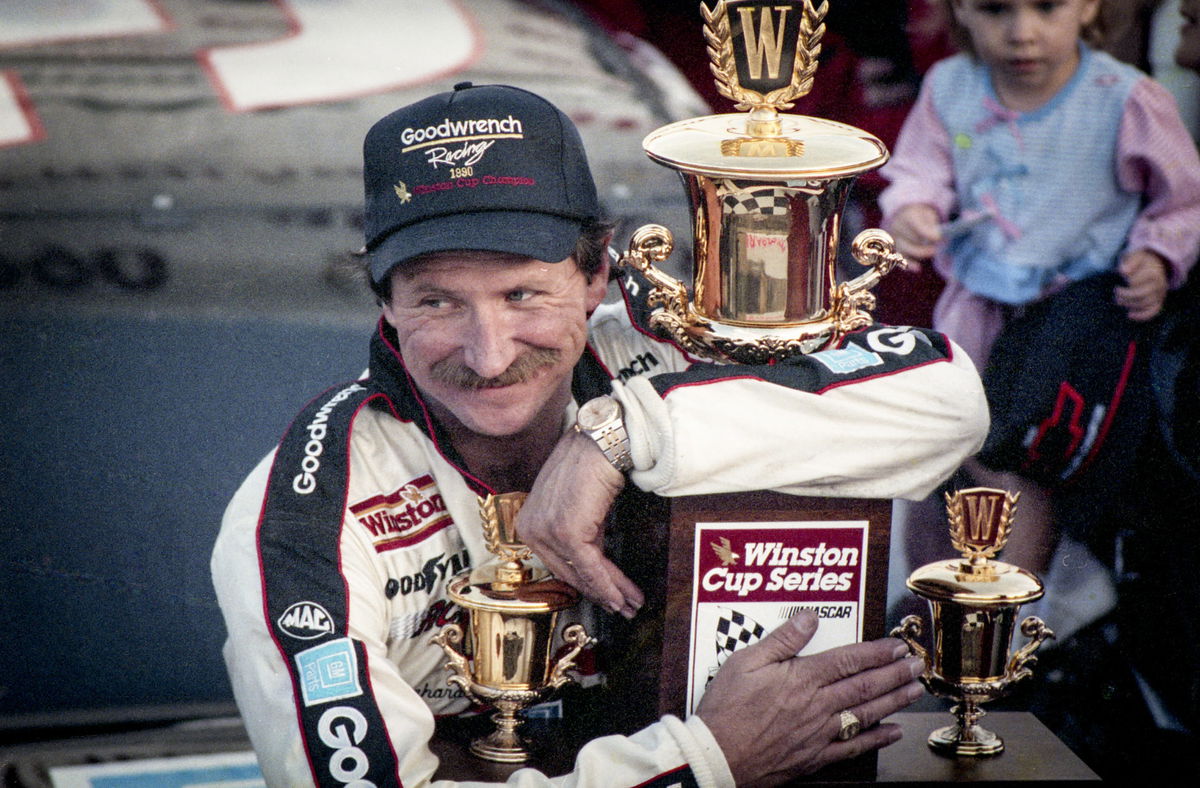
Getty
HAMPTON, GA – NOVEMBER 18: Dale Earnhardt celebrates his 4th NASCAR Winston Cup Championship after the Atlanta Journal 500, NASCAR Winston Cup race, Atlanta Motor Speedway on November 18, 1990 in Hampton, Georgia.. (Photo by Brian Cleary/Getty Images)

Getty
HAMPTON, GA – NOVEMBER 18: Dale Earnhardt celebrates his 4th NASCAR Winston Cup Championship after the Atlanta Journal 500, NASCAR Winston Cup race, Atlanta Motor Speedway on November 18, 1990 in Hampton, Georgia.. (Photo by Brian Cleary/Getty Images)

Getty
HAMPTON, GA – NOVEMBER 18: Dale Earnhardt celebrates his 4th NASCAR Winston Cup Championship after the Atlanta Journal 500, NASCAR Winston Cup race, Atlanta Motor Speedway on November 18, 1990 in Hampton, Georgia.. (Photo by Brian Cleary/Getty Images)

Getty
HAMPTON, GA – NOVEMBER 18: Dale Earnhardt celebrates his 4th NASCAR Winston Cup Championship after the Atlanta Journal 500, NASCAR Winston Cup race, Atlanta Motor Speedway on November 18, 1990 in Hampton, Georgia.. (Photo by Brian Cleary/Getty Images)
When NASCAR first convened a committee in February to gather feedback on the future of its championship format, only one member suggested eliminating the playoff system altogether. Fast forward to last week, and the conversation had shifted dramatically: several influential committee members spoke in favor of scrapping the playoffs entirely and returning to the full-season points format that determined the champion by total points accrued over all races, a system in place until 2003.
Watch What’s Trending Now!
In 2004, NASCAR introduced the “Chase” format to inject more excitement into the final races, where, after 26 events, the top drivers qualified for a 10-race showdown. Over the years, tweaks were made, culminating in the 2014 overhaul that created the current 16-driver playoff over the last 10 races, with eliminations at three cutoffs and a winner-takes-all final.
Now, as noted by The Athletic‘s Jeff Gluck, NASCAR is seriously contemplating a full return to the old 36-race championship, after fan engagement dips to an unprecedented decline.
NASCAR championship format under review following dissatisfaction
One major drive behind the discussion is star power. NASCAR today struggles with a scarcity of household names capable of transcending the sport, unlike the eras of Jeff Gordon or Dale Earnhardt Jr., who could command attention beyond the track, from hosting “Saturday Night Live” to drawing casual viewers. Part of this stems from the playoff system itself, which “often does not focus on the best drivers, let alone reward them,” as perceived by Gluck. With the short rounds and elimination structure, the spotlight frequently shifts to mid-pack drivers scrambling to qualify for the 16-driver field.
As the regular season ends, coverage centers on who barely makes the playoffs, not on who consistently dominates. By the time only 8 contenders remain, only 4 races remain in the calendar, often overlapping NFL Sundays, leaving true stars short shrift. In contrast, a full-season format would elevate elite drivers throughout the year, calling attention to repeat winners and the consistent performers who would otherwise go unnoticed.
The side effects of the current system have been showing in the numbers each year. For instance, the recent Round of 12 opener at Loudon faced a 31.8 percent drop in viewership compared to last year, also making it the lowest-rated Cup season race. And not just that, it was also down from last year’s fourth playoff race, which was held at Kansas.
Another concern is how the playoff format devalues the regular season. Drivers and teams know that a single win in 26 races can secure playoff eligibility, meaning early-season mistakes carry fewer consequences. Gluck addressed, “If a driver wrecks in the Daytona 500 and then blows an engine in the Las Vegas spring race… all that really matters is making it through the playoff rounds in the fall.” A full-season points system would give every race weight, compelling drivers to perform at their peak from March through November.
“NASCAR is now seriously weighing the possibility of drastically overhauling the playoffs or doing away with them altogether…The mere chance of going back to a 36-race schedule determining the series champion…marks a dizzying turnaround.” –@TheAthletic https://t.co/mLuIUu8z8s
— Adam Stern (@A_S12) September 25, 2025
Bad finishes would create a points deficit that could make or break championship hopes. NASCAR thrives when storylines and rivalries carry across weeks, but the current roller-coaster elimination format can obscure the true contenders until the final stretch. The rivalry between drivers such as Denny Hamlin and Kyle Larson might go underappreciated until the very end, whereas a season-long points battle would make consistent excellence more visible and meaningful.
The unique nature of motorsports further challenges the playoff approach. Unlike stick-and-ball sports, racing involves a dozen competitors simultaneously, introducing variables like crashes, mechanical failures, or traffic interference, which can disproportionately impact championship outcomes. Gluck further observed, “Having the champion of the longest season in sports potentially determined by a backmarker driver who messes up seems… an unreliable method that can cheapen the outcome.”
Each track’s distinct characteristics favor certain drivers, meaning a playoff that emphasizes just a few races may not truly reward the best performer of the season. Similarly, specialists on specific track types, like Shane van Gisbergen on road courses, can earn playoff spots despite inconsistent overall results. The current system may create dramatic moments, but it does not necessarily reflect who was the most consistent and skilled driver across the full season.
Finally, the simplicity of a full-season points format has undeniable appeal. As Gluck explains, “The champion in a full-season format is determined like this: Whoever collects the most points wins. That’s it.” There is no debate about qualification, no separate “playoff points” to calculate, and no questions about whether a winner deserved the title. Critics argue that a dominant driver could render the final races anticlimactic, but the Next Gen cars and spec parts reduce the likelihood of runaway dominance, keeping competition tight.
Earlier this season, Chase Elliott climbed from 5th to 1st in 6 races, demonstrating that consistent excellence is still rewarded under a full-season approach. The current playoff system resets the points multiple times, which “waters down greatness” and obscures who truly dominated. Returning to a season-long points format would allow legends to emerge naturally, emphasizing consistent performance and providing a clearer, more credible path to championship glory.
Driver legacies and fan disconnect in the modern era
It all traces back to the early 2000s. In 2003, Matt Kenseth clinched the Cup Series championship with just 1 win. He was consistent all year long, but fans weren’t buying it, especially since the Wisconsin native had the title locked up before the green flag even dropped on the season finale. Around the same time, Jimmie Johnson began his reign, racking up five straight championships from 2006 to 2010.
The NASCAR community saw this dominance as too predictable, prompting the creation of the elimination-style playoff format by 2014. It promised drama with a “win and you’re in” setup, stage points, and elimination cutoffs. On paper, the format delivered wild storylines and Cinderella runs, but many fans started feeling worn out.
Fans struggled to follow who was in, who was out, and how points were awarded. Martin Truex Jr., the 2023 regular-season champion, barely survived the first playoff round, while Christopher Bell missed the Championship 4 despite winning three races. The current format rewarded clutch performances more than consistent results, and as many fans say, it feels “gimmicky” and affects the perceived integrity of the sport.
NASCAR could adopt a hybrid system where season-long performance matters, ensuring the championship feels more earned while keeping drama high. Fans simply want the integrity of the sport maintained, with simpler rules, fair recognition for consistency, and a playoff system that evolves rather than confuses.



